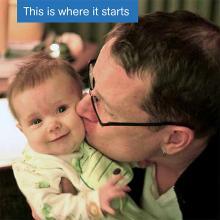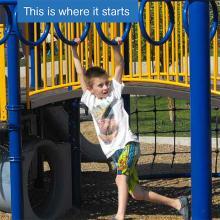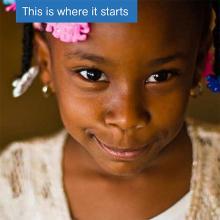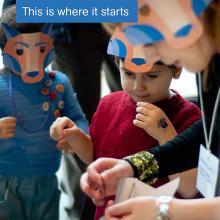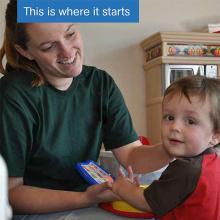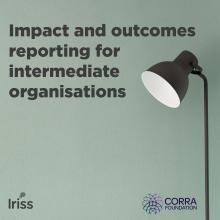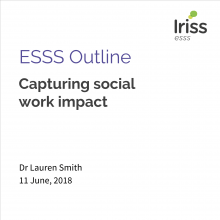This case study is part of This is Where it Starts, a collection of eight case studies on work with children and parents in early years. Case study seven.
Background
Aberlour Bridges is an early intervention model aiming to break cycles of poverty and deprivation and tackle the long-term cost implications of under-achievement. The overall aim of the service is to develop and deliver interventions with parents, carers and children in order to improve children's educational, health and wellbeing outcomes.
The service was established in June 2008 in the Possilpark area of North Glasgow to work with families affected by parental substance misuse, if possible, at an early stage of intervention. For the first three years, the service had an Action Research component incorporated, with a parttime researcher from the University of Stirling. Her remit was to review and evaluate the work of the service on an on-going basis in order to develop evidence about which interventions can be effective in improving outcomes; support changes which other services can make to similarly improve children's outcomes; and embed sustainable evaluation processes and skills within the service (Burgess, 2011). This work has resulted in the development and publication of a Service Practice Manual, heavily supported by practice knowledge gained from Sandra Sweeten, service manager, and workers over the three years, which will act as a blue print for other services. Accordingly, Dundee Aberlour Bridges started in 2012.
Funding (and costs where available)
- Funding: 2008 - September 2011: Cash for Kids, The Robertson Trust, Glasgow Addiction Service and North Glasgow Community Health Care Partnership (CHCP) and Scottish Government. Current funding to June 2013: Inspiring Scotland's Early Years Early Action Fund.
- Costs: £300K per year
Size and number of staff involved
- 1 service manager
- 1.5 education workers
- 2 full time children's workers
- 1 part time family worker
- 1 sessional family literacy worker (8 hours per week)
- 1 sessional play therapist (12 hours per week)
Referral routes
Self-referral, nursery, education, GP practices, health visitors, social work, addictions
Key partners
All of the above referral routes
Established
2008.
Key messages
Use the foundations and strengths which are already exist
The work with children is framed within a resilience perspective with particular emphasis on enhancing protective factors in the areas of educational experience and attainment, peer relationships, and social networks and activities. The work takes place on school days in school, in Aberlour's service base in Ardoch House and in the community, offering one-to-one support and group work for children and parents. It is a community-based service which receives referrals from parents/carers, social work, health and education services, and has very close working links with the local GP, nurseries and primary schools within the area. From the period 1 October 2011 to 30 September 2012, Bridges staff have worked with 29 families referred to the service. This has included 51 children and their siblings at least one of whom falls within the pre-birth to eight age range. In addition they supported additional numbers of children in group settings within the school and nursery environments.
Make support, education and learning practical and fun!
The person-centred service model offers a 'menu' of interventions, undertaken with families according to individual needs. This includes practical, social and emotional support for parents/carers at times when they identify they have the most need, such as early mornings to establish routines to get children ready and to school on time. Individual and group parenting programmes, joint adult and child play sessions and educational support through individual and group work in school and outwith school, such as homework support for children and their parents are also key elements of the service. All of the interventions are intended to be flexible in order to meet the individual needs of children and their families.
The Menu
For Children
- Time To Talk - aims to develop cooperative skills and effective communication - eye contact, turn taking; sharing; attention and memory development; listening skills; and awareness of feelings and emotions
- Seasons for Growth (Children) - an education programme catering for young people aged six to eighteen years old, within an environment of like-to-like peer support when dealing with loss and grief. The overall aims are to promote resilience, enhance coping resources and develop life skills.
- Oh Lila and Rory - resources to enable children to talk and makes sense of their lived experiences in relation to parents' substance use
- Huge bag of worries - Supports children to verbalise their worries and emotions
- Homework sessions - Individual homework or learning sessions which were also offered during school holidays to keep up the momentum of learning.
For Parents
- Group work, examples of which include looking at and exploring feelings, child development and keeping safe
- Seasons for Growth (Adults) - A peer programme of support that enables parents and carers to manage and cope with their experiences of trauma and loss
- Literacy work - one-to-one and group work which takes place in various forms
- Health and wellbeing workshops
For Children and Parents Together
- Homework sessions
- Social activities and outings
- Emotional literacy sessions
- Parent and child play sessions
- Health and wellbeing.
Comments from children about the activities are very positive
-
'He (Education worker) is always happy and smiling'
-
'The groups are awesome'
-
'Great'
-
'It helps me and my sister'
-
'I like the playroom'
-
'I like coming here with my mum'
-
'It's fun'
-
'She (children's worker) is very nice and when I'm upset she helps me'
We are on a journey with you
Professionals on the Bridges project have undertaken a variety of activities in order to support children and families on their pathway towards achieving the outcomes based on the Wellbeing Indicators outlined in Getting it right for every child (Safe, Healthy, Achieving, Nurtured, Active, Respected, Responsible, Included). Examples of activities include:
- Accompanying and supporting parents to plan and attend health, dental, optical and other appointments with their children
- Facilitating small groups of parents and children focused on healthy eating and healthy lifestyles. These groups were facilitated over six weeks, after which the groups came together to share their learning and celebrate the work that they had done.
- A family literacy worker has worked with individual parents helping them to understand weighing and measuring in relation to making up baby's bottles, as well as supporting them to understand labels on medicine bottles
- Aberlour Bridges has supported children to attend school by offering practical supports to parents around establishing evening and morning routines. A particular example of this includes working with one family where mum became physically unwell and her mobility became an issue as a result of chronic alcoholism, extended family support was limited and mum was concerned about getting the children to and from school. Service staff were able to link in with the family ensuring that the children went to school and returned home safely for a period of eight weeks until mum's mobility was improved enough for her to re-establish this responsibility.
- One-to-one education work has been carried out with those children who had difficulty focusing in a classroom setting. This work focused on supporting the child to continue with curriculum work while supporting them to regulate their emotions and understanding internally using a nurture based approach. This work included both the younger children referred to the service, and in some cases, their older siblings.
- The staff have facilitated sessions for 'growth groups' for children and 'time to talk' groups within various schools and nurseries in the local community enabling children to develop their confidence and self-esteem. These pieces of work have also assisted children in their preparation for transition from nursery to primary and for those older children, for the transition to a new class room in the primary school.
- The children and education workers have worked closely with parents helping them to understand the importance of education in their child's development. Where necessary, staff offered support to parents and have assisted them to engage with school and nursery staff at various intervals during the school calendar.
The service recognises the importance of building strong relationships with parents. However, they reflect that maintaining a core staff team in times of uncertain funding can impact on long-term, stable relationships with parents and this is a central challenge to their work.
Helping people to help themselves will have a lasting impact in the community
By actively working in partnership with other agencies, Aberlour Bridges has enabled children and parents to participate in community based activities such as Depot Arts, puppet theatre, rapping sessions and Glasgow Book festival 'Aye Write', as well as various activities through the Open Museum campaign. By working with parents and children, workers have helped them to recognise other activities and links that are within the community (ie Link Up Possilpark). Enabling parents to have a voice and a forum has helped them to develop 'natural' relationships offering supports to each other. This peer support has been facilitated through drop-in sessions for parents.
Evidence-based outcomes lead to evidence-informed practice for workers
As an organisation, Aberlour is committed to evidencing the impact their support has on the lives of children and parents. Workers are trained in designing and delivering programmes of intervention and support, but also in monitoring and measuring progress. A variety of validated tools support the qualitative as well as quantitative analysis of the services. These tools and approaches provide the evidence for improved outcomes. Value is placed on the personal stories of children and parents as a way of evidencing impact of support which can be a powerful form of feedback. Below is an example provided by a parent supported by the Bridges project:
'I am still getting support from one of the education workers focusing on homework but I feel I am progressing well and I am more confident than I have ever been. Both my daughter and I have both benefited from this, I feel good about being able to pass on these skills on to her, knowing that I am helping her to do well in school. I know that I can ask for help from staff at any time. I also link in with the new family literacy worker because I still want to do well with my parent council role. I have reports and things to write just now, we are looking at paragraphs and things, the support has helped me no end. The drop-in has been great, I can come to the service and be myself, I can talk about stuff that has happened and I know it's confidential. Staff are always here to help. It's a two-way process, if I can help out others I will and likewise they will help me. I enjoy the fact that I get to meet other parents and socialise with them. In fact, we meet up outwith the service and go for coffee and offer each other support when we need it. The service has made a big difference for me and for my relationship with my daughter, homework times are a little less fraught and we enjoy spending the time together'.
Evidence-based programmes that support early intervention and prevention underpin the support provided to parents and children. For example, Solihull training is incorporated by staff into the various aspects of parenting work that they do in both group and one-toone settings. This approach enables the service staff to further support parents to recognise and acknowledge the importance of attachment in their child's development.
Further information and references
Burgess C (2011) Glasgow Bridges: An Aberlour family service: final action research report, Stirling: Aberlour.
Burgess C (2011) Glasgow Bridges: An Aberlour family service: final action research summary, Stirling: Aberlour.
Burgess C and Sweeton S (2012) Aberlour Glasgow Bridges service - Cheryl Burges, Sandra Sweeten. Audio, Glasgow: Iriss.

